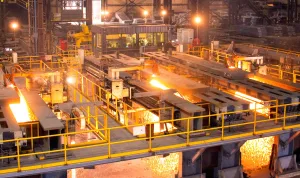How Global Demand for Steel Shapes Nucor Corporation’s Strategies and Performance

The global steel market is a dynamic and ever-changing landscape, and Nucor Corporation, as one of the leading steel producers, is significantly affected by international demand trends. Understanding how global demand for steel impacts Nucor Corporation provides insights into the company’s strategic responses, operational adjustments, and market positioning. This article explores the various ways in which global steel demand influences Nucor’s business and its approach to maintaining competitiveness and profitability.
1. Impact on Production and Capacity
Production Adjustments
Global demand for steel directly influences Nucor’s production levels and capacity utilization. When international demand is high, Nucor may increase its production to meet the rising needs of global markets. Conversely, during periods of lower demand, the company may adjust its production rates to avoid overcapacity and excess inventory.
Capacity Expansion and Investment
In response to growing global demand, Nucor may invest in expanding its production facilities and technological capabilities. By enhancing its manufacturing infrastructure, Nucor can increase its capacity to serve international markets and capitalize on emerging opportunities. Strategic investments in new technologies and facilities support the company’s ability to meet global demand efficiently.
2. Pricing and Market Positioning
Pricing Strategies
Fluctuations in global steel demand can impact pricing strategies. When demand is strong, steel prices generally rise, benefiting producers like Nucor with increased revenue potential. During periods of weak demand, Nucor may need to adjust its pricing to remain competitive in the global market. Effective pricing strategies are crucial for optimizing profitability and market share.
Market Positioning
Nucor’s ability to adapt to global demand trends influences its market positioning. By aligning its product offerings and marketing strategies with international demand patterns, Nucor can enhance its competitive edge. Understanding global market trends helps Nucor position itself effectively and capture opportunities in various regions.
3. Supply Chain and Logistics
Raw Material Sourcing
Global demand for steel affects the availability and cost of raw materials. Nucor’s supply chain is influenced by fluctuations in the prices of iron ore, scrap metal, and other key inputs. Managing these supply chain dynamics is essential for maintaining cost efficiency and ensuring a steady supply of materials to support production.
Logistical Challenges
Serving international markets presents logistical challenges, including transportation and distribution. Nucor must navigate global logistics to ensure timely delivery of steel products to its customers. Effective management of logistics and supply chain operations is crucial for meeting global demand and maintaining customer satisfaction.
4. Strategic Adaptations
Global Market Expansion
To capitalize on global demand, Nucor may explore opportunities for expansion into new markets. By entering emerging markets and strengthening its presence in existing regions, Nucor can diversify its revenue sources and reduce reliance on any single market. Strategic market expansion supports long-term growth and stability.
Product Innovation
Meeting the diverse needs of international customers requires innovation in product development. Nucor invests in research and development to create advanced steel products that cater to global market requirements. Innovations such as high-strength steel and environmentally friendly solutions enhance Nucor’s competitive position and appeal to international customers.
5. Financial Performance and Risk Management
Revenue and Profitability
Global demand for steel has a direct impact on Nucor’s revenue and profitability. High demand generally leads to increased sales and improved financial performance. Conversely, fluctuations in demand can affect revenue stability. Nucor’s ability to manage these fluctuations through strategic pricing and cost control measures is crucial for maintaining financial health.
Risk Mitigation
To mitigate risks associated with global demand fluctuations, Nucor employs risk management strategies. These may include diversifying its customer base, securing long-term contracts, and implementing hedging strategies to manage raw material price volatility. Effective risk management helps Nucor navigate uncertainties and maintain business continuity.
Conclusion
Global demand for steel plays a significant role in shaping Nucor Corporation’s strategies and performance. By adapting its production capacity, pricing strategies, and market positioning, Nucor responds to the evolving demands of the international market. Strategic investments, supply chain management, and risk mitigation are essential for navigating the complexities of global demand and ensuring continued success. Nucor’s ability to align its operations with global market trends supports its competitive edge and long-term growth.



